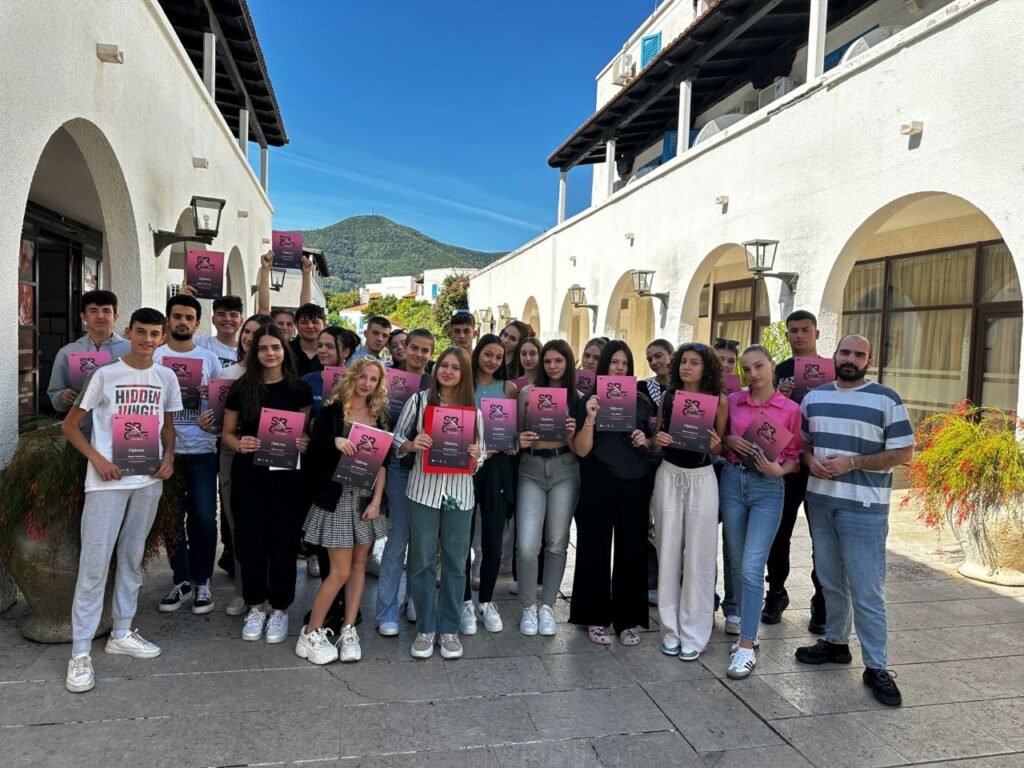Centre for Civic Education (CCE) organized a five-day Intercultural Camp for high school students, from 18 to 22 September 2024, in Budva, as part of the project “HEART: Support for the Empowerment and Resilience of Youth Today,“ financially supported by the EU and co-financed by the Ministry of Public Administration.
“Meeting the participants of the Intercultural Camp organized by CCE is always a special experience for me. Young people show interest in topics that are not sufficiently covered in educational curricula and a desire to improve their knowledge. These camps offer truths instead of dilemmas, foster virtues instead of stagnation, and broaden horizons instead of isolation,” assessed Svetlana Koprivica, a professor of Montenegrin language and literature and one of the lecturers at the programme.
“It was a real pleasure to recognize the curiosity and readiness for active participation in discussions. This group was willing to think critically about radicalization and its impact on gender equality. They demonstrated a solid understanding of how radical movements open doors to violations of women’s human rights globally and successfully identified examples of such influence in Montenegro,” noted Kristina Janković, a human rights activist who led one of the workshops.
Throughout the intensive programme, 25 young people learned about acceptance and tolerance, the consequences of radicalization, skills in intercultural dialogue and peaceful conflict resolution, and the importance of respecting diversity regardless of personal characteristics. They also learned how to actively advocate for contemporary human rights concepts. The sessions were interactive, featuring short introductory lectures followed by workshops, simulations, debates, and open discussions.
“As with anything unfamiliar, we have certain prejudices. However, as the lectures progressed and topics evolved, those prejudices broke down, and by the third day, I found everything fascinating and so interesnting. I particularly liked the concept in which all participants were equally included and respected. This is a new life experience for me, one I will remember fondly, and I hope to participate again,” shared Ahmet Redžematović, a student at the “Mehmed Fatih” Madrasa, one of the participants.
“Participating in this programme was an extremely valuable experience for me, allowing me to develop new skills and expand my knowledge. Through various workshops and team activities, I improved my communication skills and learned how to work better in a team. This program also gave me the opportunity to connect with like-minded people, and the experiences gained will certainly be useful in the future,” said Helena Fatić, a second-year student at “Miloje Dobrašinović” Gymnasium in Bijelo Polje and one of the participants in the Intercultural Camp.
Faris Markišić, a final-year student at “Bećo Bašić” Secondary School in Plav, shared a similar perspective. “Through working with lecturers and peers, I learned how to overcome misunderstandings and build mutual respect, regardless of differences. By exchanging experiences with others, I became aware of how important these skills are, both in my school and my community. After the camp, I feel empowered to apply what I’ve learned and actively contribute to promoting interculturalism, especially among my peers,” he said.
The Intercultural Camp was attended by high school students of various ages from 12 Montenegrin high schools across 9 municipalities – Bar, Herceg Novi, Podgorica, Tuzi, Bijelo Polje, Kolašin, Plav, Berane, and Rožaje. They worked with experts from academia, the formal education system, and the NGO sector.
The programme was successfully completed by: Bojana Marinković, Jaroslava Segedij, Enes Fetahović, Ivan Černogolov, Ida Crnovršanin, Helena Fatić, Mona Omerhodžić, Boško Rakočević, Bogdan Veličković, Milana Zejak, Amil Kuburović, Barbara Crnić, Aleksa Zejak, Tijana Bukilić, Katarina Rakočević, Faris Markišić, Radojka Rajković, Petra Piletić, Nina Davidović, Ana Ognjanović, Jovana Laković, Martina Piletić, Merjem Ramović, Ahmed Bektešević, and Ahmet Redžematović.
Marlena Ivanović, Programme Associate

